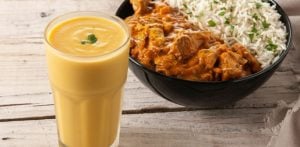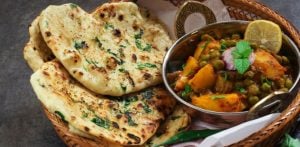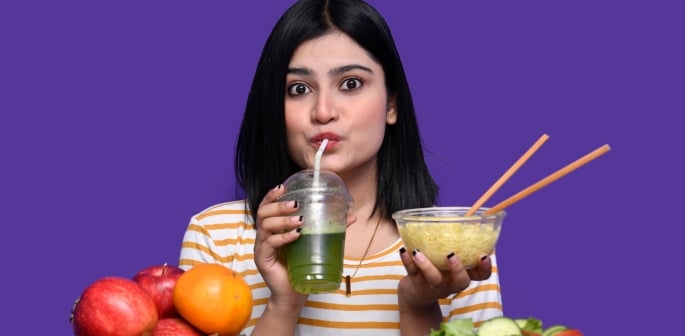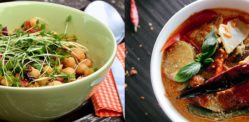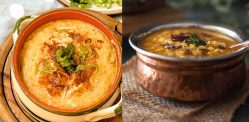It is important to have a balanced diet as well as a balanced lifestyle.
In a world where fast food and convenience often overshadow traditional eating habits, maintaining a healthy diet can be a challenge.
This is especially true in a culturally rich and diverse country like Pakistan, where culinary traditions are deeply rooted in history and flavour.
The Pakistani diet is renowned for its robust use of spices, aromatic herbs, and a variety of meats and vegetables, creating dishes that are both flavourful and satisfying.
However, the traditional diet also includes foods high in fats and sugars, which can pose health risks if consumed in excess.
Whether you are a resident of Pakistan or a food enthusiast looking to incorporate Pakistani flavours into your diet we delve into healthy and unhealthy ingredients, healthy Pakistani dishes and things to go alongside a good diet.
Healthy Pakistani Ingredients

A typical Pakistani diet is rich in flavours, spices, and variety, reflecting the country’s diverse culture and culinary traditions.
It includes a mix of grains, vegetables, dairy and meat, with a strong emphasis on full-flavoured spices and herbs.
Pakistani cuisine includes many ingredients such as grains.
Mayo Clinic says that grains “provide fibre, vitamins, minerals and other nutrients. Whole-grain foods help control cholesterol levels, weight and blood pressure. These foods also help lower the risk of diabetes, heart disease and other conditions”.
This includes wheat for flatbreads and rice for dishes like biryani and pulao.
Cancer researcher Sylvie Tremblay says: “Both flatbread and wheat bread offer ample amounts of B-complex vitamins – a family that includes folic acid and niacin. These nutrients support your metabolism, nourish your skin and maintain healthy blood circulation.”
In terms of vegetables, one can eat a variety of lentils that are used to make daal, which is a staple dish in Pakistani cuisine.
Commonly used vegetables include potatoes, tomatoes, onions, okra, aubergine and green leafy vegetables.
They are used in curries, stir-fries and as side dishes.
The NHS describes vegetables as “a good source of vitamins and minerals, including folate, vitamin C and potassium. They’re an excellent source of dietary fibre, which can help to maintain a healthy gut and prevent constipation and other digestion problem A diet high in fibre can also reduce your risk of bowel cancer”.
Regarding meat, there is a variety of choices.
For example chicken, beef, mutton, lamb, fish and seafood.
Dietitians Australia explains that “meat and poultry are great sources of protein. They also provide lots of other nutrients your body needs, like iodine, iron, zinc, vitamins (especially B12) and essential fatty acids. Dairy foods include milk used in tea and desserts, yoghurt for raita and lassi and cheese for dishes like paneer”.
Harvard says: “The nutrients and types of fat in dairy are involved with bone health, cardiovascular disease, and other conditions. Calcium, vitamin D, and phosphorus are important for bone building, and the high potassium content of dairy foods can help lower blood pressure”.
Fruit and nut options are abundant in Pakistani cuisine.
Those that are popular are mangoes, oranges, apples, bananas and guavas.
Healthy Eating explains the benefits of fruits “reduce[s] the risk of chronic disease: Eating a diet rich in fruit may reduce [the] risk for stroke, cardiovascular disease and type 2 diabetes. Improve[s] heart health: The potassium in fruit can reduce the risk of heart disease and stroke. Potassium may also reduce the risk of developing kidney stones and help to decrease bone loss. It may also have a positive impact on digestive health. Polyphenols are antioxidants that have been shown to alter gut microecology or the proportion of healthy versus harmful bacteria”.
There are also spices and herbs, such as turmeric, cumin, coriander, garam masala, and chilli powder are used to flavour dishes.
British Heart Foundation says: “Garlic has been reported to help improve blood pressure and cholesterol levels.
“Turmeric is thought to have anti-inflammatory effects due to a substance called curcumin that is found in it.
“Cinnamon has also been linked to improvements in blood sugar levels.”
Unhealthy Pakistani Ingredients
In Pakistani food, ghee, butter and oils are used to cook various foods such as samosas, kebabs and more.
Nutritionist Franziska Spritzler says: “Consuming an excess amount of ghee can lead to increased weight gain and increased risk for obesity.
“Also, consuming excess saturated fat can increase the risk for heart disease and stroke.”
There are many sweets and desserts that are indulgent and not very healthy, such as gulab jamun, jalebi, and barfi are enjoyed during celebrations.
Harvard Health explains “consuming too much added sugar can raise blood pressure and increase chronic inflammation, both of which are pathological pathways to heart disease. Excess consumption of sugar, especially in sugary beverages, also contributes to weight gain by tricking your body into turning off its appetite-control system because liquid calories are not as satisfying as calories from solid foods.”
A high intake of salt, which is common in pickles, chutneys, and many savoury Pakistani dishes, can increase blood pressure and the risk of heart disease.
Clinical researchers say; “Excessive salt intake is associated with high blood pressure.
“As this effect likely drives cardiovascular morbidity and mortality, excessive salt intake is estimated to cause 5 million deaths per annum worldwide”.
Dr Chulaporn Roongpisuthipong, a clinical nutritionist describes that in terms of short-term effects, “some people become bloated because of water retention or feel excessively thirsty after a salty meal”.
In the long term, “high blood pressure can eventually lead to strokes and congestive heart failure. As the kidneys constantly work overtime to flush out excess salt, they can develop kidney disease”.
Rice is a prominent ingredient in Pakistani cuisine.
Dr Vanishree Aithal says: “White rice does not have the outer layer ie the husk, bran and germ.
“It is also called polished rice. Hence, it has fewer vitamins and minerals compared to other varieties of rice.
“It also has a higher glycemic index and is a good source of natural carbohydrates.
“In brown rice, the outer husk is removed but it has the bran layer and the germ hence, it contains more fibre as compared to white rice.”
Healthy Pakistani Dishes
Pakistani cuisine is known for its rich flavours, diverse ingredients, and aromatic spices.
While many traditional dishes are indulgent, there are plenty of healthy options that do not compromise on taste.
Daal

Lentils are a great source of protein, fibre, and essential nutrients.
Daal can be made with various types of lentils and minimal oil, making it a hearty and healthy choice.
According to BBC Good Food, “studies demonstrate that regularly eating lentils reduces your risk of chronic diseases such as diabetes, obesity, cancer and heart disease. This is thanks to their rich content of protective plant compounds called phenols”.
Moreover, “lentils are especially rich in prebiotic fibre which promotes digestive function and ‘fuels’ the beneficial gut bacteria which are so important for our health”.
Nutritionist Sharon O’Brien says lentils are “packed with B vitamins, magnesium, zinc, and potassium. Lentils are made up of more than 25% protein, which makes them an excellent meat alternative. They’re also a great source of iron, a mineral that is sometimes lacking in vegetarian diets”.
Chana Chaat

Chickpeas are rich in protein and fibre.
This salad is made with boiled chickpeas, diced tomatoes, onions, and cucumbers, dressed with lemon juice and spices.
Food n Heal explains that “people who take chickpeas or hummus regularly have been shown to have higher nutrients like dietary fibre, vitamins A, C, E, as well as fatty acids, and minerals, compared to those who don’t.
Dietitian Cynthia Sass says: “Some possible benefits of chickpeas include helping control blood sugar, manage weight, and support heart and gut health.
“Chickpeas are naturally gluten-free and not a common allergen, so they do not carry many risks.”
Chicken Tikka
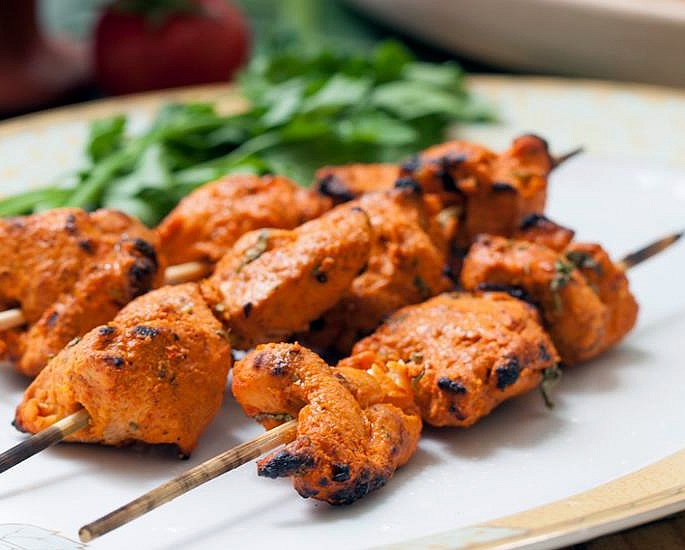
Chicken tikka is marinated in a mixture of yoghurt and spices, and then grilled.
The use of lean chicken and grilling methods makes it a healthier alternative to fried foods.
Alco Eats say: “If prepared right, chicken tikka is actually healthy since it is marinated with curd and spices and baked using skewers, it has the least oil usage, and roasted chicken is always beneficial.
“Also, chicken is a form of lean protein that provides tremendous dietary value and should be a part of your weekly diet plans if you follow a non-vegetarian lifestyle.”
Vegetable Stir-Fry

A mix of colourful vegetables stir-fried with minimal oil and flavoured with garlic, ginger, and spices. This dish is low in calories and high in vitamins and minerals.
Big Swich express that “stir-frying results in tender-crisp vegetables that retain more nutrients than if they were boiled. And since stir-frying generally requires only a small amount of oil, the fat content is relatively low”.
Palak Paneer

Spinach is a superfood loaded with iron, magnesium, and vitamins A, C, and K.
When cooked with low-fat paneer, it becomes a nutritious dish rich in protein and calcium.
Tower Tandoori convey that “palak paneer is made with spinach and cottage cheese, which is a low-calorie, high-protein ingredient. This combination offers a low-calorie meal that contains a high amount of protein, vitamins, minerals and antioxidants. Protein, plus a low amount of carbs, offers a feeling of fullness, which can help to manage weight and prevent weight gain”.
In addition, dietitian Tracey Shaffer says: “Cottage cheese is packed full of nutrition. It is a source of protein, which helps to build and repair muscle.
“A half-cup serving of low-fat (2%) cottage cheese typically has around 90 calories, 12 grams of protein and 2.5 grams of total fat, making it a go-to option for athletes or anyone looking to increase their protein intake.”
Fish Curry

Fish is a great source of omega-3 fatty acids and lean protein.
A fish curry made with tomatoes, onions, and a blend of spices offers a healthy and flavourful meal option.
Slender Kitchen’s perspective is that “fish is an incredibly lean source of protein, coconut milk is filled with healthy fats, and the fresh herbs and spices are all loaded with vitamins and minerals”.
Dietitian Jessica Ball describes: “Fish provides a high-quality source of protein and boasts essential omega-3 fatty acids, vitamins and minerals.
“Studies have even found that people who eat fish may increase their life expectancy and gain protective benefits against developing certain health conditions, including heart disease and cancer.”
Dalia

A warm and comforting dish made from cracked wheat and oats, cooked with milk or water and sweetened with natural sweeteners like fruits or a small amount of honey.
Heart UK, say that “oats are a good source of protein. They contain more than most other grains – a 40g serving of rolled oats contains 4.8g protein. [They] contain essential vitamins and minerals, including manganese, phosphorus, magnesium, iron, zinc, selenium and several B vitamins. Oats contain certain antioxidants which are thought to have further benefits for health”.
Things to do Alongside a Good Diet
Maintaining a healthy diet is crucial for everyone, including Pakistanis, who have a rich culinary tradition that is both flavourful and diverse.
A balanced diet contributes to overall health, helps in maintaining an ideal weight, and reduces the risk of chronic diseases.
One can do the following things alongside having a good diet.
All of these elements are at play together.
If not done, efforts to promote health may be countered.
Staying Hydrated
Staying hydrated is crucial for maintaining optimal health and well-being.
Water plays a critical role in regulating body temperature through sweat and respiration.
When you’re dehydrated, your body can struggle to maintain its normal temperature, which can lead to overheating or heat stroke in extreme conditions.
Hydration is vital for maintaining the volume of blood circulating through your body, which can affect blood pressure and heart rate.
Medical advisor Karen Cross, says that hydration “ delivers oxygen throughout the body – Blood is more than 90 per cent water, and blood carries oxygen to different parts of the body”.
Dehydration can lead to a higher heart rate and potentially increase the risk of cardiovascular stress.
Adequate hydration is essential for physical performance.
Even mild dehydration can impair endurance, decrease strength, cause fatigue, and lead to muscle cramps.
Staying hydrated helps to ensure that your body functions optimally during exercise or any physical activity.
Hydration has a significant impact on brain function and mood.
Dehydration can impair attention, memory, and cognitive performance, and even lead to feelings of anxiety or depression.
Adequate water intake helps keep your mind sharp and can improve mood.
Moreover, another benefit is that water, “lubricates the joints – Cartilage, found in joints and the disks of the spine, contains around 80 per cent water. Long-term dehydration can reduce the joints’ shock-absorbing ability, leading to joint pain”.
Proper hydration helps to keep your skin moisturised and can reduce the appearance of fine lines and wrinkles.
Adequate hydration is essential for the production of lymph, which carries white blood cells and other immune system cells throughout the body.
Proper hydration can thus help strengthen your immune system, making you better able to fight off infections.
Aim for about 8 glasses (about 2 litres or half a gallon) of water a day, though needs can vary based on activity level, climate, and individual health.
Regular Physical Activity

Regular physical activity is essential for maintaining good health and well-being.
It offers numerous benefits that extend across various aspects of physical, mental, and emotional health.
Regular exercise strengthens the heart and improves circulation, which can reduce the risk of heart disease and stroke.
It helps lower blood pressure and increases HDL (good) cholesterol levels while decreasing LDL (bad) cholesterol.
Physical activity helps to burn calories, which is crucial for weight loss and maintaining a healthy weight.
It also increases metabolism and muscle mass, further aiding in weight management.
Exercise is a powerful mood booster.
Furthermore, according to Rethink Mental Illness, exercise “relieves symptoms of stress, increases self-esteem, and reduces cognitive decline”.
It releases endorphins, which are natural mood lifters, helping to reduce feelings of depression, anxiety, and stress.
Regular physical activity can also improve sleep quality, which is beneficial for overall mental health.
Engaging in regular physical activity can improve cognitive function, including memory, attention, and processing speed.
It can also reduce the risk of cognitive decline and neurodegenerative diseases like Alzheimer’s disease.
Regular exercise is known to reduce the risk of developing several chronic diseases such as type 2 diabetes, cancer, and metabolic syndrome.
It also helps manage these conditions if they already exist.
Adequate Sleep

Adequate sleep is a fundamental component of a healthy lifestyle, playing a crucial role in physical, mental, and emotional health.
Sleep allows your body to repair itself.
During sleep, your body produces proteins that are crucial for cell repair and growth, helping to recover from the wear and tear of daily activities.
Adequate sleep strengthens the immune system, making you less susceptible to infections and illnesses.
Sleep helps regulate stress hormones and ensures proper functioning of the heart and blood vessels, reducing the risk of cardiovascular diseases.
Sleep affects the levels of hormones that control appetite, such as ghrelin and leptin.
Lack of sleep can lead to increased hunger and appetite, potentially contributing to weight gain.
Sleep is vital for cognitive processes.
It enhances memory, learning, problem-solving skills, and creativity.
Adequate sleep also helps in processing and consolidating new information.
Sleep has a significant impact on mood.
Insufficient sleep can lead to irritability, stress, and an increased risk of depression and anxiety.
Good sleep helps regulate mood and improve overall emotional resilience.
Chronic sleep deprivation has been linked to various health issues that can shorten life expectancy, such as heart disease, diabetes, and stroke.
To regulate sleep, RNIB expresses that one can “try to establish a regular sleeping routine by going to bed and waking up at the same time every day. A relaxation routine can also help you prepare for sleep. For example, you could listen to relaxing music or nature sounds, or have a bath before bed to help you wind down. For some people, meditation (also known as mindfulness) can help quieten the mind. This could involve spending a few minutes focusing on your breathing before bed or while lying in bed”.
If one wants to improve their diet, they should be aware of the nutritional benefits of what they are eating as well as the drawbacks of unhealthy foods.
Alongside eating good food, one can also engage in physical activities, get adequate sleep and stay hydrated.
Many foods such as fruit, grains and oats are healthy.
In contrast, high salt, and high sugar intake are unhealthy in large quantities.
It is important to have a balanced diet as well as a balanced lifestyle to accommodate this.






















